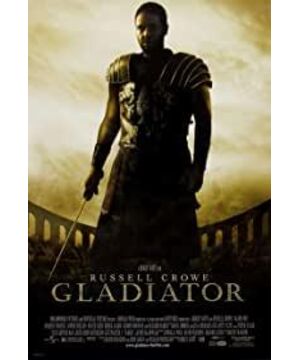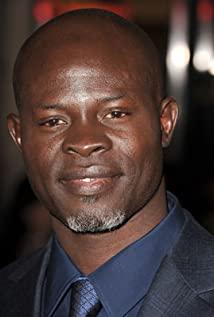After a lapse of 20 years, in the days of staying at home affected by the epidemic, I watched several classic movies one after another, including Ridley Scott directed, Russell Crowe, Joaquin Phoenix, Connie The large-scale epic movie "Gladiator" starring Nielsen and others was released in China in August 2000 and once occupied the top of the box office chart; Won the Best Film Award at the 73rd Academy Awards.
The film tells the tragic and heroic story of the ancient Roman general Maximus (Russell Crowe), a man trusted by Emperor Marcus Aurelius (Richard Harris). And the admired general, born in Spain controlled by Rome, has vast fields and castles, and also has a beautiful wife and young son. During his tenure as a general of the Roman Empire, he led Roman soldiers to attack the city and conquered the land, making great achievements.
The movie begins with a battle between the Roman legions and the Germanic barbarians led by Cosmos. If this war is won, the Roman Empire will completely rule the entire Mediterranean Sea and the vast area of Europe. For this reason, Emperor Marcus Aurelius regardless of age. Already high, come to the front line to supervise the battle. The war is about to start in the cold and gloomy mountainous battlefield. The director did not directly show the audience the tragic killing, but showed a field that is about to be harvested in the camera and the picture of Maximus returning home. This picture is used throughout the film. The film plays a role of echoing before and after, and points out the inner needs of the protagonist Maximus, who is tired of war and longs to return home after the war. This kind of demand is very in line with the common psychological characteristics of many Chinese and foreign heroes, that is, the desire to stay away from killing after becoming famous. , the desire to return to tranquility. The appearance of this shot is very good to fit the psychological needs of the audience with the protagonist, and make a strong contrast for the upcoming tragic war. In this regard, director Scott is definitely a master of psychology and a master of art who is very good at revealing the fate of characters.
What impressed the audience in particular was the smile on Maximus' face when he saw the bird on the branch when the camera turned back to the battlefield of slaughter, reflecting the invincible general's kind nature that was not changed by the killing. This is also a very good account of the valuable quality and authenticity of the characters. Through the close-up and conversion of the picture within a few tens of seconds, the psychology, character and quality of Maximus are revealed. From this point of view, many directors in our country lack this method of discovering the inner needs and spiritual qualities of the characters. Although many directors are trying this method, the films they make always seem to lack some connotation and beauty.
The tragic fighting after the movie was very spectacular. The soldiers screamed in anger, the arrows roared, and the blood and fire intertwined, which very well showed the cruelty of war in the cold weapon era. This war does not take a long time in the whole film, but it fully reflects Maximus' excellent command level and the love of his soldiers. As a military commander, the victory of the war is the peak of his personal achievements, but This peak of exploits pushed him to the abyss of doom - the battle for the throne.
Of course, Maximus is a fictional character in the movie, and the Roman emperor Marcus Aurelius was killed by his son Commodus does have a certain historical basis. After Commodus succeeded to the throne, he implemented a brutal rule and killed members of the Roman parliament in an attempt to recover There is also a real historical basis for the dictatorship of the ancient Roman monarchy. This kind of court power struggle is similar no matter in the East or the West, but the movie has a unique way to put Maximus, who is eager to return to his homeland after the war, into the vortex of the struggle for the succession of the throne and become a victim. In the blink of an eye, he was turned into a slave by a general with great military achievements, and he needed to win the chance of survival in the brutal gladiatorial battle, and this chance seemed so slim.
The main line of the movie is the main line of Maximus, who is forced to fight in the gladiatorial arena and avenge the murdered wife and children. The key character in this main line is the old slave owner who drives the plot development. It was also a struggle to survive on the arena. After stabbing opponents again and again to win the cheers of the audience, he was pardoned by Emperor Marcus Aurelius and became a free man. Therefore, he is convinced that it is the greatest glory to be a gladiator. It is to win the cheers and recognition of the audience through killing, and finally win a great reputation. This is exactly in line with the glory of Maximus as a general who fought everywhere. Therefore, the two people moved from confrontation to cooperation, providing a necessary condition for Maximus to take revenge on the Colosseum.
Of course, this film also shows that people in ancient Rome attached great importance to fame, the kind of social awareness that it is easy to kill the other party, but it is not easy to destroy the other party's reputation. It also fully reflects a basic principle of ancient Roman society: to have the love of the people and Support is worth more than any violent victory. This is also the embarrassment that Commodus, as a tyrant, has to face. He not only wants to kill Maximus, but also defeat Maximus as a Roman general for the glory and the love of the people. He cannot fulfill Mark by means of assassination. The good name of Sims, but he wanted to kill Maximus who was a slave through competitive gladiatorial combat, and he also wanted to achieve the goal by inciting Maximus to rage and force him to do it himself, but neither achieved the goal, so , can only achieve the goal of killing the opponent and fulfilling his prestige and reputation by challenging Maximus himself.
So, at the end of the movie is a duel scene between Maximus and Commodus in front of tens of thousands of people. In the end, Commodus, who tried his best, was killed by Maximus who was seriously injured. And Maximus also fell on the ground of the Colosseum, announced the release of the slaves with the last strength, and the power of Rome was handed over to the House of Presbyterians. The screen of the film has a cut to the wheat field and manor at the beginning of the film, and Maximus' wife and children waiting on the field road. At the same time, the Spanish-style female vocals sublimated the theme and melody of the entire movie, making it hard to leave your seat for a long time.
If this epic heroism film is the masterpiece of director Scott, it would be better to say that it is a reappearance of the historical chapter of the ancient Roman era. The exquisite costumes, weapons and props of the characters in the play, as well as the large-scale war scenes, all reproduce the characteristics and splendor of the ancient Roman era very realistically. This huge expenditure also reflects the director's creative attitude and shooting spirit. In this regard, many domestic directors who shoot ancient historical themes cannot do it, not because they lack funds, but because they lack respect for history and responsibility for the audience. I really hope that the director will take a good look at this film, reflect deeply, and find the gap.
View more about Gladiator reviews











